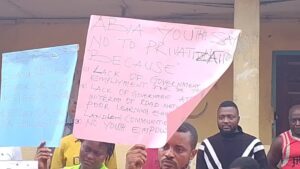By David Okon
Barely two days after the people of Etomi community in Etung Local Government Area of Cross River State took to the streets in protest against the planned privatization of the government-owned cocoa estate, residents of Abia community have now joined their voices to the growing resistance.
Brandishing placards with inscriptions such as “Our estate isn’t for sale” and “Give us our land back if you are tired of running the cocoa plantations,” the protesters expressed their vehement opposition to the government’s privatization plan. They raised a chorus of concerns, including the absence of access roads, poor educational facilities, and limited youth employment opportunities, arguing that privatization is no solution to these longstanding challenges.
The protest mirrored that of Etomi community, amplifying a collective sentiment of betrayal and neglect. Members of Abia community maintained that the cocoa was planted on land they had willingly donated to the government under the understanding that their youths and women would be engaged in managerial roles.
They lamented that the government had not honoured its promise of paying royalties to the community, compounding a situation made worse by years of inadequate infrastructure. The protesters called on the state government to abandon any thoughts of privatization and instead address the stark infrastructural deficits plaguing Abia community.
“There are no access roads, no electricity, no good learning environments, and no employment opportunities for our people,” one protester declared. “If you privatize the cocoa estate, you will be taking away the only remaining opportunity for our youths.”
Elder Patrick Ndifon, an opinion leader who led the protest, spoke passionately about the breach of trust:
“Privatization is not an item of the provision in the agreement. It was never part of the agreement. Our fear is that we don’t have land. We have exhausted all our farmlands. We are believing that in 34 years, government shall have exhausted all the years given to them. Our message to government is that they should withdraw the statement attempting to privatize the estate. We are seriously in opposition to that decision.”
Mrs. Beatrice Tawo, the community’s women leader, echoed this position, urging the government to relinquish the farms altogether if it was no longer able to manage them:
“If government is tired of managing the estates, let them quit the farms.”
The youth leader, Comrade Lawrence Ntui, added his voice to the protest, decrying the absence of social amenities and calling on the authorities to redirect their focus:
“We need access roads, electricity, and good learning environments, not an attempt to deprive us of our cocoa farms.”
With Abia community now standing firmly with Etomi, the opposition to the privatization of the cocoa estate has taken on a broader dimension, sending a clear message to the Cross River State Government to rethink its policy and engage with the communities over their concerns.













